'I'm the only woman to survive the Joola disaster 'published at 13:18 BST 26 September 2022
Mariama Diouf is the only female survivor of the Joola disaster.
Read MoreMariama Diouf is the only female survivor of the Joola disaster.
Read MoreClashes between two rival forces which support Libya's UN-backed government on Sunday left five people dead and 13 others wounded, news agency AFP reports quoting medical sources.
The gun battle in Zaouia, some 40km (25 miles) west of the capital Tripoli, was between fighters linked to the defence ministry and those with ties to the interior ministry, local media reported.
The victims included a 10-year-old girl, the report said.
The fighting broke out over a dispute about fuel smuggling which is common in the country, a security source told AFP.
The clashes come amid a political crisis between backers of rival Libyan Prime Ministers Abdulhamid Dbeibah and Fathi Bashagha, whose forces are vying for control of the oil-rich nation.
Mr Dbeibah's government was installed last year as part of a United Nations-led peace process, while Mr Bashagha was appointed by Libya's eastern-based parliament in February.
Senegal's national football team coach, Aliou Cissé, lost 11 members of his family in the Joola disaster.
Read MoreBrighton and Hove Albion's Zambian international Enock Mwepu has returned to England for medical tests after falling unwell during a trip to Mali.
Read More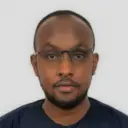 Abdi Dahir
Abdi Dahir
BBC Monitoring, Nairobi
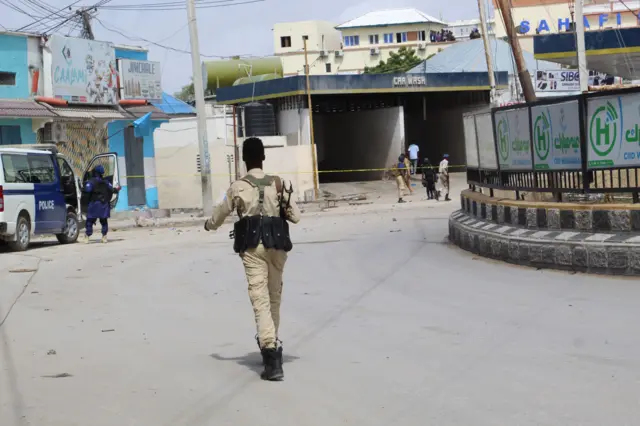 Image source, EPA
Image source, EPASomali government forces have been fighting al-Shabab militants for many years
Somalia has confirmed that Turkish drones have joined an ongoing military offensive against the al-Qaeda-allied al-Shabab militants.
Somalia's Interior Minister Ahmed Mo'alim Fiqi told privately-owned Universal Somali TV that the Turkish-owned surveillance and combat drones provided air support for the Somali army.
In recent weeks the Somali government forces and armed clans in central Hiiraan and Galgudud regions have dislodged al-Shabab from some areas.
The state TV reported that the army had expanded the offensive against al-Shabab in central Somalia to parts of the south-western Gedo region, where the militants hold some territory.
Turkey is among the countries that have been supporting the Somali government.
Mogadishu hosts Turkey's largest overseas military base, which opened in 2017, where thousands of Somali soldiers have been training.
Read more: Why African states are buying Turkish drones
South Africa's President Cyril Ramaphosa says that rolling power cuts being experienced in the country will not end anytime soon but things are changing, albeit slowly.
"We are making progress in the implementation of the additional actions I announced in July, even though the effects may not be immediately felt," Mr Ramaphosa said in in his weekly newsletter., external
Allow X content?
This article contains content provided by X. We ask for your permission before anything is loaded, as they may be using cookies and other technologies. You may want to read X’s cookie policy, external and privacy policy, external before accepting. To view this content choose ‘accept and continue’.
The country is enduring acute energy shortages, with its state energy provider, Eskom, suffering from a lack of investment amid allegations of corruption.
Coal is used to generate 80% of South African electricity but a new deal signed last week will increase the country's renewable energy output by 10% through private investment in wind and solar projects.
These are not expected to come online until 2024.
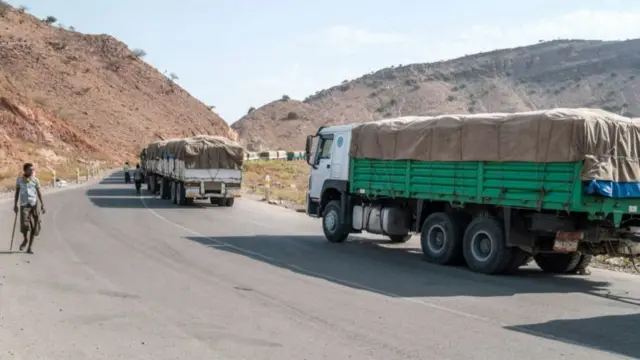 Image source, AFP
Image source, AFPWFP has been distributing much-needed aid in Tigray region (file photo)
Debris from a drone strike in Ethiopia's Tigray region hit a lorry carrying humanitarian aid and injured the driver on Sunday, a spokesman of the World Food Programme has told the Reuters news agency.
"Flying debris from the strike injured a driver contracted by WFP and caused minor damage to a WFP fleet truck," the spokesperson is quoted as saying.
The lorry was delivering food to internally displaced people in Tigray, Reuters reports.
A spokesman for the rebel TPLF Getachew Reda termed the incident "an outrageous crime."
Several previous air strikes have been reported by the Tigray rebels since fresh confrontations erupted on 24 August - which have not been acknowledged by federal authorities.
Read more:
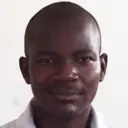 Ishaq Khalid
Ishaq Khalid
BBC News, Abuja
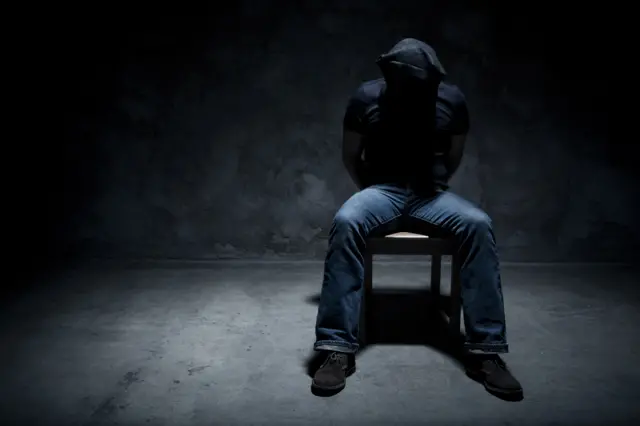 Image source, Getty Images
Image source, Getty ImagesPolice in Nigeria have arrested a suspected notorious kidnapper known for flaunting his wealth on social media.
Many knew John Lyon as a banker whose posts always advised people to work hard and to stay safe, local media report.
A spokesperson for the police in the southern Bayelsa state told the BBC that Mr Lyon was in their custody.
The suspect was transferred to the state after being arrested in the capital, Abuja, said Asimi Butswat.
"When they get the money they go to Abuja to live lavishly," Mr Butswat told the BBC.
At least ten kidnappings for ransom in Bayelsa state had been traced to his gang, the authorities say. But he is not the the group's leader.
Many Nigerians have expressed dismay over the development with some describing the suspect as a generous person who was fond of giving gifts.
Mr Lyon has not yet commented publicly.
But a video reportedly of him while in police custody has surfaced on social media. In the short clip, the detained man is seen asking for forgiveness after his arrest.
The police are expected to give further updates on Monday afternoon.
 BBC World Service
BBC World Service
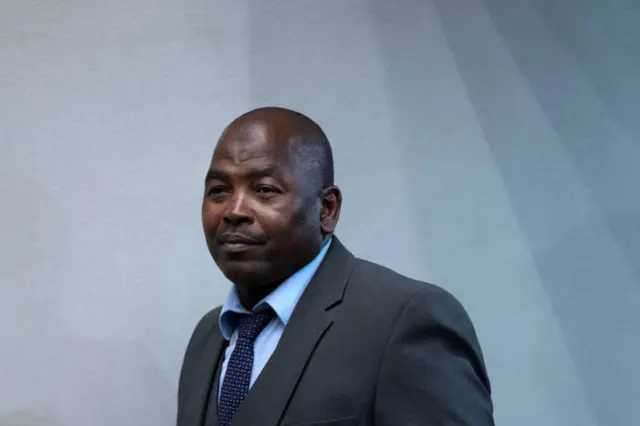 Image source, Reuters
Image source, ReutersMahamat Said Abdel Kani pleaded not guilty to charges of war crimes
The trial of a former senior rebel commander in the Central African Republic has started before the International Criminal Court.
Mahamat Said Abdel Kani pleaded not guilty to charges of war crimes and crimes against humanity.
He is accused of being in charge of a police compound in the capital Bangui in 2013 where supporters of the deposed President François Bozizé were brutally tortured.
The prosecutor will rely on the evidence of 43 witnesses in the trial which is expected to last several months.
Mr Said's defence team dispute the reliability of the evidence against him.
Moroccan golfer Ines Laklalech says winning the Ladies Open de France is "something priceless" and hopes she can inspire others on the continent.
Read More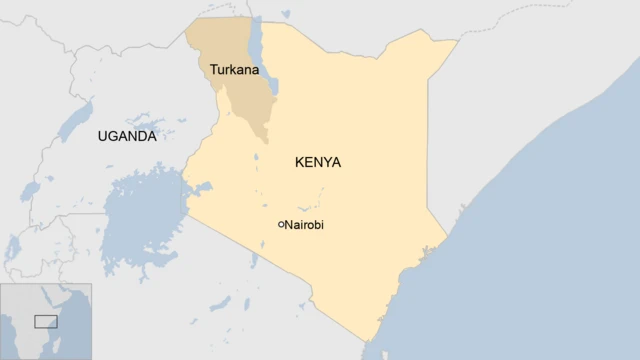
Kenya has launched an operation to arrest cattle rustlers who killed 11 people in an ambush on Saturday.
Eight officers, two civilians and a local chief are said to be among the victims of the violence in Turkana county.
Kenya's police say the operation aims to arrest the perpetrators, recover the stolen animals and firearms and return normalcy to the area.
It urged people to offer information that may lead to the arrest of the gang and recovery of the stolen animals.
Allow X content?
This article contains content provided by X. We ask for your permission before anything is loaded, as they may be using cookies and other technologies. You may want to read X’s cookie policy, external and privacy policy, external before accepting. To view this content choose ‘accept and continue’.
Clashes over livestock and water are common in the area, which is also facing a worsening climate.
In a statement, Jeremiah Lomorukai, the Governor of Turkana, said security forces in the region needed better support from the government to end cattle rustling.
 BBC World Service
BBC World Service
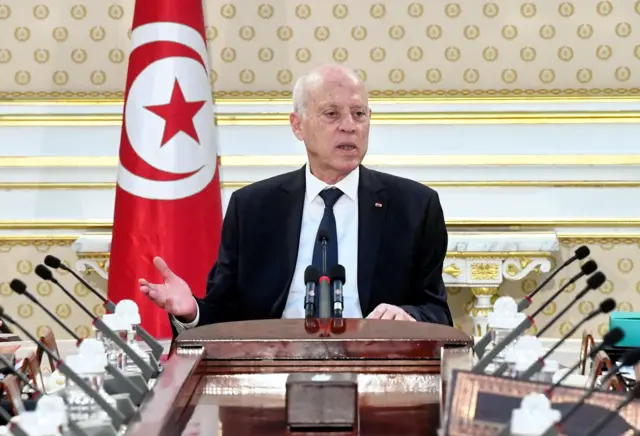 Image source, Tunisian Presidency/Getty Images
Image source, Tunisian Presidency/Getty ImagesPresident Kais Saied has been criticised for failing to tackle inflation
Anti-government demonstrations have taken place in several suburbs of the Tunisian capital, Tunis.
Marchers criticised the administration of President Kais Saied for failing to tackle inflation and rising prices for staple goods.
Videos on social media from the Douar Hicher district show supermarket customers scuffling over packets of sugar.
In one district on the outskirts of Tunis riot police fired tear gas to disperse protesters who had blocked roads and were throwing stones at officers.
The demonstrators were angry at the suicide of a local man who had allegedly been harassed by police for selling fruit without permission.
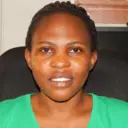 Patience Atuhaire
Patience Atuhaire
BBC News, Kampala
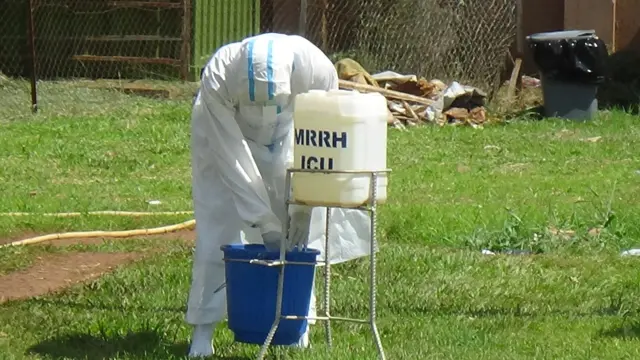 Image source, Getty Images
Image source, Getty ImagesThere have been 34 suspected cases of Ebola in Uganda
The number of suspected Ebola infections continues to rise in Uganda.
The health ministry says there have been 34 suspected cases. It believes 21 deaths were probably caused by the Ebola virus.
Health teams are continuing to trace any people that may have come into contact with it.
The outbreak began in the central district of Mubende but has now spread to two neighbouring districts.
There are as yet no confirmed cases in the capital Kampala.
This is the fourth Ebola outbreak Uganda has faced.
Neighbouring countries have said that they are on high alert.
Read more:
 BBC World Service
BBC World Service
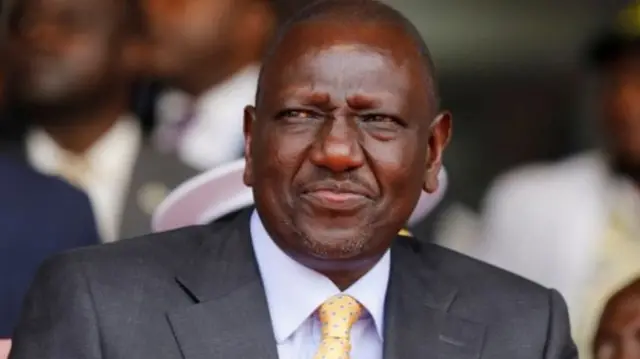 Image source, Reuters
Image source, ReutersPresident William Ruto has scrapped a subsidy on petrol
The Kenyan president, William Ruto, has told the BBC he's open to buying fuel from Russia.
Several countries have refused to engage with Moscow since the invasion of Ukraine but Mr Ruto said he's considering all available options.
"I am now going to move on to the agenda of making sure that we have government-to-government relationships that will progressively now begin the journey to bring the prices of fuel down," President Ruto said.
He added: "All options are available to us as a country."
Kenya is facing a deepening economic crisis, sending the price of food and fuel soaring.
Despite rising fuel prices Mr Ruto defended his decision last week to scrap some fuel subsidies.
He said they were unsustainable and prone to abuse.
Our proverb of the day:
Quote MessageYou can fix a loose hole in your clothes but you cannot fix a loose mouth."
A Beti proverb sent by Sandrine Mengue Essomba in Yaoundé, Cameroon.
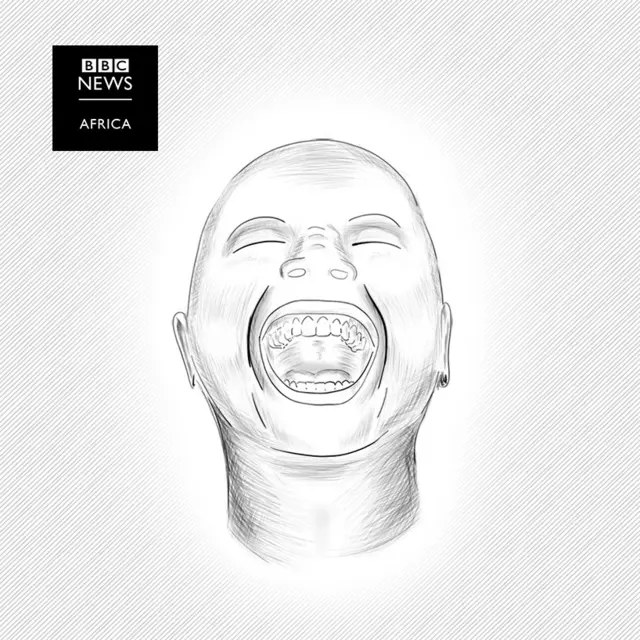
With a major exhibition of his work at London’s Royal Academy of Arts due to open in just a few days’ time, here is another chance to listen to Zeinab Badawi’s 2020 interview with William Kentridge. Considered one of the world’s greatest living artists, Kentridge is versatile, hard-hitting and his talent spans many different genres. How has South Africa’s difficult, violent and racist past influenced his work?
(Photo: William Kentridge, Rome, 2015. Credit: Stefano Montesi/Corbis/Getty Images)
Rupal Rajani explores heritage and identity in a frank and open conversation with podcaster Shivani Dave and comedian Nimisha Odedra, both with Ugandan and Kenyan Asian heritage.
Hear how identity is more than where you’re from and how the experiences of previous generations affected the speakers.
Host: Rupal Rajani. Producer: Ruchi Tandon. Series producer: Ollie Peart. Online producer: Rachael Smith. Executive Producer: Kathryn Morrison.
Originally broadcast on local BBC radio.
For more stories about the Ugandan Asian expulsion, visit bbc.co.uk/desistories.
Rupal Rajani explores why Leicester found itself a city at the centre of the story and talks to the Mayor of Leicester Sir Peter Soulsby and local businessman, Dharmesh Lakhani.
Leicester was already home to a large East African population and after the expulsion some were concerned thousands would head for the city. Leicester City Council took out an advert in an Ugandan newspaper in an attempt to dissuade any new arrivals.
Peter was elected to the city council the year after the advert was placed in the Ugandan press. Dharmesh is the owner of the family run restaurant on the now famous ‘Golden Mile’, an area of Leicester synonymous with Ugandan Asians.
Listen to the reasons behind the advert and how political extremists made life difficult for the Ugandan Asians.
Host: Rupal Rajani. Producer: Ruchi Tandon. Series producer: Ollie Peart. Online producer: Rachael Smith. Executive Producer: Kathryn Morrison.
Originally broadcast on local BBC radio.
Rupal Rajani has a powerful and emotional discussion with Stephen Poulton who worked in a resettlement camp at RAF Stradishall in Suffolk, and Fiyaz Mughal, whose family passed through this camp when he was a young child.
At the time Idi Amin gave Asians living in Uganda 90 days to leave, around 28,000 held British passports. The Conservative Prime Minister at the time was Edward Heath. Supported by the opposition, he made a political decision to allow the refugees into the country.
With such large numbers moving to Britain in a short space of time, the Uganda Resettlement Board was set up to process the new arrivals.
Resettlement camps were established across the country with the aim of finding work and accommodation for the Ugandan Asians.
Host: Rupal Rajani. Producer: Ruchi Tandon. Series producer: Ollie Peart. Online producer: Rachael Smith. Executive Producer: Kathryn Morrison.
Originally broadcast on local BBC radio.
If you’re affected by anything you hear, the BBC Action Line has information about help and support available via bbc.co.uk/actionline.
Stephen Sackur speaks to South Africa’s controversial populist politician Julius Malema, leader of the Economic Freedom Fighters. Allegations of political corruption, power cuts and mass unemployment are pushing South Africa to the brink of chaos. Could one of Africa’s richest nations be consumed by insurrectionist violence?